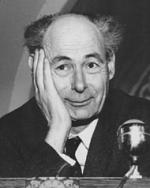Disable ads!
Paul Tournier
Two religious experiences would underlie Tournier’s later work. When he was 12, he became a Christian. As he grew up he became active in the church, started writing articles about Calvinism, and argued for orthodoxy and against liberalism. His Christian experience did not, however, become totally meaningful to him until a second experience, which he called a “face-to-face encounter with God”. This encounter transformed his life and changed everything, and gave him a vital interest in “that other side of life, for its inner dimension, so necessary to us." This encounter caused him to radically change his medical practice. Instead of merely treating the physical disorders of his patients, he started addressing the deeper problems of the whole person. In 1937 he wrote a letter to all his patients informing them of this new orientation. Tournier describes his newfound interest in the whole person thus: I can speak endlessly of myself, to myself or to someone else, without ever succeeding in giving a complete and truthful picture of myself... The same thing happens with all these people who come to see me, and take so much trouble over their efforts to describe themselves to me with strict accuracy; inevitably I form an image of them which derives as much from myself as from them. If they go and see one of my colleagues he will certainly not see them exactly as I do. And they for their part will not show themselves to him in the same way they show themselves to me. The reader will see now why it is that this problem of the person has for twenty years been of such absorbing interest to me. It has a general significance which is of vital importance for all thought and civilization: what is man? But it also has a particular significance, which is equally important for my own life: who am I, really, myself? Some have argued that Tournier believed in universal salvation, that all would eventually be saved; however, it is more accurate to state that he believed in the ultimate triumph of Good over Evil in mankind through Christ's reconciling work. In response to a letter from a graduate student writing a master's thesis on his theology, Tournier wrote: That you say as a theologian that I am a universalist is evident, in the sense that I believe that Jesus was sent into the world to save the sinners that we all are. This is what I understand Saint Paul to say when he mentions that sin has entered the world through one man, Adam, and spread to all men, and that he calls Jesus the second Adam through Whom redemption entered the world for all men, and even as he says 'all of creation,' that the redemption of Christ is the victory of God over the Fall. I believe that this great plan of salvation is universal, concerns not only all men but the universality of the world and that Jesus on the Cross has accomplished this Salvation, this reconciliation of men with God, that the 'chastisement' as Isaiah says is fallen upon Him to free men from the malediction of the Fall. This plan of God therefore seems to be collective, global, universal. Tournier was active in the Ecumenical Institute of the World Council of Churches.
 Read more on wikipedia.org Read more on wikipedia.org
 All quotes by Paul Tournier All quotes by Paul Tournier
 Edit Edit
|

|
|
|
|
|
Background photo by Giuliana
|